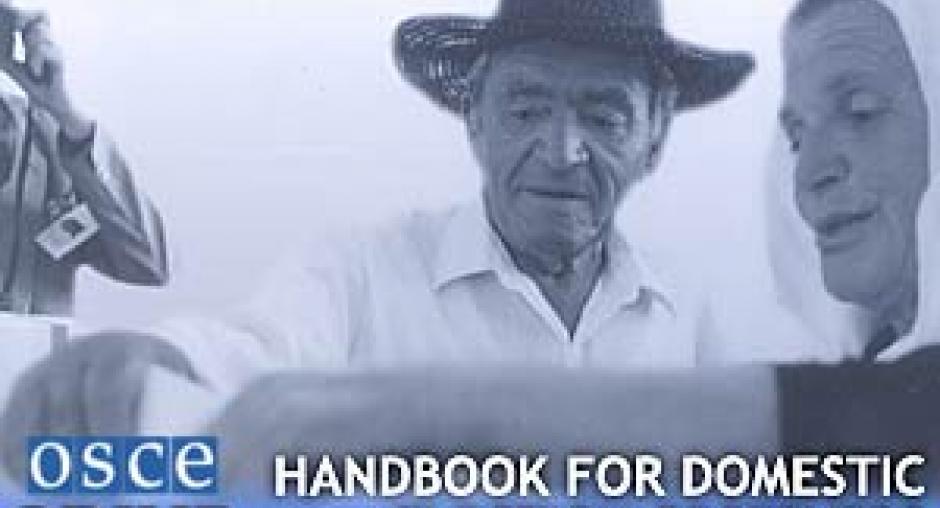Newsroom
OSCE/ODIHR launches handbook for domestic election observers
WARSAW 8 October 2003

(OSCE)A Handbook for Domestic Election Observers was launched at the OSCE's Human Dimension Implementation Meeting in Warsaw on 6 October 2003. (OSCE)
WARSAW, 8 October 2003 - The OSCE's Office for Democratic Institutions and Human Rights (ODIHR), Europe's leading institution in the field of election observation, has released the organization's first publication aimed at domestic election observers. The handbook provides methodologies and tools that non-partisan domestic election observer groups can use for developing a comprehensive and systematic approach to election observation.
Produced with the participation of more than 20 experienced domestic election observer groups from across the OSCE region, as well as with input from international experts, the handbook will also be of use to domestic observers that represent political parties and candidates.
"Thousands of people become election observers every year, both domestically and as international observers," said Ambassador Christian Strohal, Director of ODIHR. "While international observation has received the most attention and publicity, the importance of domestic observation has grown significantly. Observation by domestic observer groups can help to deter violations and promote confidence in the honesty and integrity of the electoral process. This handbook is of great help to all those involved in such an important task."
Gerald Mitchell, Head of the ODIHR's election section, added: "The publication of this handbook is evidence of the ODIHR's continuing commitment to supporting the work of civil society groups involved in this essential task. The methodology used in this handbook is also useful for domestic observer groups outside the OSCE region."
The ODIHR has provided considerable support to domestic observer groups over the past decade and in June 2003 organized the largest-ever gathering of domestic observer groups in Europe. Held in Zagreb, this meeting resulted in the development of a series of commitments outlining the responsibilities of domestic observer groups. A declaration was made calling on all countries in the OSCE region to ensure that domestic observers have effective access to all stages of the electoral process and are able to receive technical and financial support from national and international sources.
Produced with the participation of more than 20 experienced domestic election observer groups from across the OSCE region, as well as with input from international experts, the handbook will also be of use to domestic observers that represent political parties and candidates.
"Thousands of people become election observers every year, both domestically and as international observers," said Ambassador Christian Strohal, Director of ODIHR. "While international observation has received the most attention and publicity, the importance of domestic observation has grown significantly. Observation by domestic observer groups can help to deter violations and promote confidence in the honesty and integrity of the electoral process. This handbook is of great help to all those involved in such an important task."
Gerald Mitchell, Head of the ODIHR's election section, added: "The publication of this handbook is evidence of the ODIHR's continuing commitment to supporting the work of civil society groups involved in this essential task. The methodology used in this handbook is also useful for domestic observer groups outside the OSCE region."
The ODIHR has provided considerable support to domestic observer groups over the past decade and in June 2003 organized the largest-ever gathering of domestic observer groups in Europe. Held in Zagreb, this meeting resulted in the development of a series of commitments outlining the responsibilities of domestic observer groups. A declaration was made calling on all countries in the OSCE region to ensure that domestic observers have effective access to all stages of the electoral process and are able to receive technical and financial support from national and international sources.
